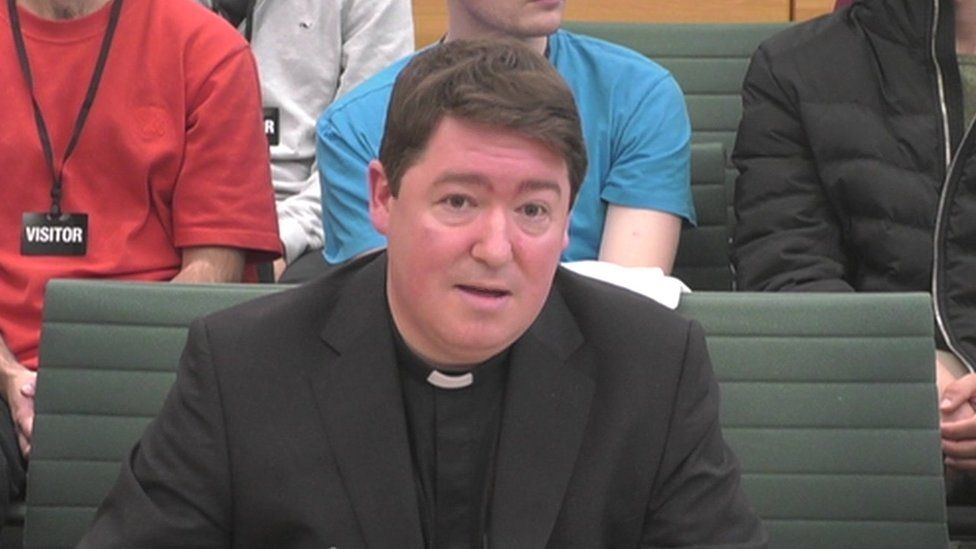Baptisms 'a ticket to something' for some asylum seekers - vicar
- Published

Some asylum seekers see baptisms "as a ticket to something" and most baptism requests were when they were appealing an asylum claim, a vicar has told MPs.
Rev Matthew Firth told the Home Affairs select committee he was brought groups of asylum seekers looking to convert.
MPs were hearing evidence after it was claimed Clapham attacker Abdul Shokoor Ezedi got asylum on the grounds of his conversion to Christianity.
The Bishop of Chelmsford told MPs she queried Rev Firth's claims.
"The figures don't quite add up to me," the Right Reverend Guli Francis-Dehqani said.
She added: "I have spoken to clergy who have turned people down [for baptism] because they did not feel they met the criteria."
The clergy took baptisms very seriously, she said.
Rev Firth, who was a priest at St Cuthbert's church in Darlington, left the Church of England in 2020, and is now a vicar for the Free Church of England.
He previously wrote in the Telegraph that there was a "conveyor belt" system of baptisms of asylum seekers hoping to obtain leave to remain in the UK on religious grounds.
He told MPs that when he came to St Cuthbert's in 2018 he found there was a "surprising number" of asylum seekers being baptised.
He honoured the ones that were already in process but then "started to look into it a bit further".
He said: "After those baptisms, week-in, week-out, significant groups of mainly Iranian and Syrian young male asylum seekers were being brought to me in sizeable cohorts."
Rev Firth told MPs that cohorts of "six or seven" people were brought to him "every two or three weeks".
Asked who brought the asylum seekers to him, Rev Firth said: "There was a particular individual who I think had received right to remain in the UK through the asylum application system."
"This particular individual", he added, "was bringing lots of people who [he] said needed to be baptised".
The Diocese of Durham has strongly rejected Rev Firth's claims.
It says there had been 15 baptisms in the area of potential asylum seekers since 2014, seven of which were performed by Rev Firth.
Asked about these figures by the committee, Rev Firth said that he did not have access to the parish registers, so was not familiar with those figures.
He told committee members that a lot of people who came to him for baptisms "had already failed in their asylum claim".
He said: "I spotted that dynamic going on and pressed pause in a reasonable way."
Asked by MP Tim Loughton what happened when he pressed pause, he said they "melted away", saying: "People would, fairly quickly, stop coming to that morning service… they weren't coming along to church after that."
He later added: "I think some of them are in very difficult situations and they are seeing baptism as a ticket to something whether that it's true or not."
The cleric told the committee there are some worship centres positioning themselves to be centres of legal help and support and advice for people who have had their applications refused.
There is bit of a grey area developing there, he suggested.
Discussion around asylum seekers converting to Christianity resurfaced after the case of Abdul Shokoor Ezedi, who was found drowned after being named as wthe suspect in a corrosive substance attack on a woman and her two daughters near Clapham Common.
He was an Afghan refugee who came to the UK in a lorry in 2016.
He was convicted of sexual assault and exposure in 2018 and had had his asylum claim rejected twice before he successfully claimed asylum after claiming he had converted to Christianity.
Following Rev Firth's testimony, representatives of the Church of England, the Catholic Church for England and Wales, and the Baptist Union of Great Britain were questioned about their conversion and baptism procedures.
Asked if there was guidance to clergy on baptisms for asylum seekers, Rev Canon Christopher Thomas, senior priest in the Catholic Church, replied: "No, there is not."
He told the committee that the process for someone seeking baptism generally took around nine months and involved a team of catechists who engaged with applicants on a weekly basis, and a welcome by the local bishop before a baptism ceremony.
The Right Rev Francis-Dehqani told MPs that the baptism process in the Church of England typically takes 10 to 12 weeks, while Rev Steve Tinning added that in the Baptist Church it is about six weeks.
All three church representatives were vocal that their mission was to welcome and support people in need, including asylum seekers.
At the time of the Clapham attack, the Church of England came under scrutiny for its guidelines on how clergy should engage with the Home Office when providing references for asylum seekers - a process in which priests are called to participate by the Home Office whenever an asylum claim is based on conversion.
The guidelines were published seven years ago and are currently being reviewed, but the Bishop of Chelmsford said the advice's "underlying message" won't change.
Home Office minister Tom Pursglove told MPs that Christian conversion was "not a determinative factor" in the decision-making process, and that this "is weighed within the decision making, with credibility associated to that - testing of credibility amongst a range of other factors, relevant to each individual case".
Mr Pursglove explained that from the sampling officials did ahead of today's committee hearing, this did not appear to be a recurring issue.
"What we are dealing with in terms of this hearing today, it strikes me as a subset of a subset," he said. "What we are seeing is that the vast majority of individuals where Christian conversion is a factor are saying that they have converted at that initial reporting stage."